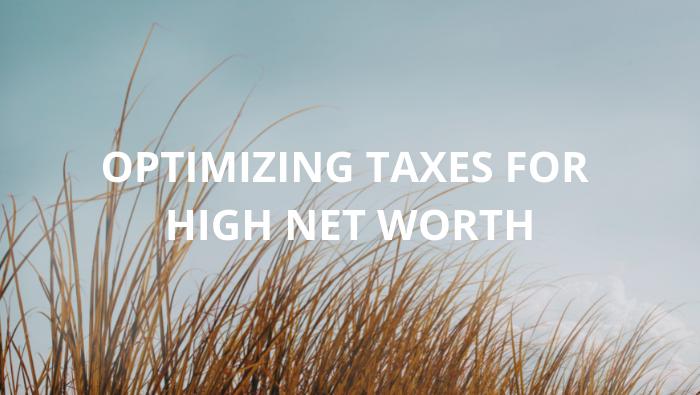Monument Resource Center
Our clients hire us because they recognize the value of our Team’s unique, straight-forward, unfiltered opinion and our tailored advice designed to answer their questions, not everyone else’s. Below, you’ll find some of the most important questions we have been asked over the years to help you better understand the role we play and the advice we give.
I love so many things about living in Virginia – the land of historic presidential homes, vineyards, and the stunning Blue Ridge mountains (there are too many personal loves to count). Enjoying a life here comes at a cost, especially in Northern Virginia with its high residential property tax rates (and high assessed values on homes that continue to climb), personal property taxes, and other local taxes — it all adds up. These costs have become more painful following the 2017 Tax Cuts & Jobs Act, which capped itemized deductions for state and local taxes (SALT) at $10,000 on federal income tax returns. It doesn’t take much in some parts of Virginia to exceed this cap if you own a home and earn an income.
Recognizing this, Virginia created a functional workaround to the federal SALT deduction for business owners. If you are a Virginia resident and an owner of a pass-through business entity, a Pass-Through Entity Tax (PTET) election may help you reduce your federal tax bill and help you find more things to love about being a Virginian.
What is a Pass-Through Entity Tax?
Usually, owners of pass-through entities pay federal and state income taxes on the net income “passed through” to them on their personal tax returns. The business entity itself does not pay income taxes.
Virginia’s General Assembly developed a system where the business entity itself is taxed at the state level, effectively allowing a federal deduction for the full amount of income taxes paid to the state. The mechanics are fairly simple, and the benefits can be numerous beyond just a SALT cap workaround:
- Business owners can elect to pay Virginia income taxes at the entity level on the business’ income.
- The business will receive a federal tax deduction on its return for the Virginia taxes paid as a business expense. (This will reduce the net income that gets passed through to the business owner for their federal return.)
- Business owners will receive a credit on their personal Virginia income tax return for the amount of tax paid by the business. (The business owner is not paying state income taxes at the individual level on the business income.)
What to Know About Virginia’s PTET
Virginia isn’t the only state helping their residents out – business owners in 33 states may make PTET elections with different rules and specifics. While it’s best to consult with an accountant familiar with Virginia’s tax laws, the key details below can help you determine if Virginia’s PTET is something that may benefit you as a business owner.
Who is Eligible?
Virginia has an “eligible owner” requirement as of 2023. This means that only the following owners of pass-through entities may benefit from refundable tax credits in the amount of the PTET paid:
- A direct owner who is a natural person subject to Virginia individual income tax OR
- An estate or trust subject to Virginias fiduciary tax
While any pass-through entity may make a PTET election, there’s little benefit if there isn’t a corresponding tax credit for a business owner’s personal income tax return for the amount paid by the business.
How Much Will I Pay?
Business owners who elect PTET can expect a 5.75% tax on the business’ taxable income at the entity level. Because this is a tax at the entity level and not personal, a business owner will not benefit from any deductions, exemptions, or credits available to an individual taxpayer in Virginia. This may result in a tax at the entity level that would be higher than the tax at the individual level, but the benefits of PTET should be viewed holistically with an analysis of total income tax savings.
There’s a World Beyond Virginia – What if I do Business in Multiple States?
One of the biggest complexities related to PTET is how to handle the differences between states and their laws when an entity does business and earns income in multiple states.
Virginia appears to be taking an accommodating stance related to PTET paid to another state by allowing credits on the individual income tax return for those taxes paid (there are some important restrictions noted in the guidelines that your accountant can weigh-in on if this applies). It’s important to note that this only applies to state income taxes on the business income – it does not apply to any other entity-level taxes that are a routine part of operating a business.
Electronic Estimated Tax Payments Are Required
For tax years after 2022, a business electing PTET must make estimated taxes if its owners reasonably believe the taxes owed would exceed $1,000. These estimates must be made in four installments ONLINE on the 15th day of April, June, September, and December (this is a slightly different schedule than for individual estimated taxes). A paper form with a check is NOT considered a valid election.
If you plan to elect PTET, it’s important to ensure there’s sufficient cash from operations to pay these estimates! If you begin planning later in the year, trying to make the necessary payments in a shorter amount of time may create a cash crunch.
How to Know if PTET is Right for You
Nothing can or should replace a thorough analysis completed by an accounting professional who is familiar with a business owner’s personal and business tax situation. However, there are a few things to think about when deciding whether a PTET election may create enough total tax savings to make sense. As a starting point, consider:
- Your business structure. Are you an S Corporation or LLC with multiple non-corporate owners? This is the primary eligibility criteria for PTET. Additionally, if the majority of your income is considered self-employment income because you are taxed as a partnership, lower net income will mean reduced self-employment taxes.
- Your county of residence and its property tax rates. If you live in a county with high property tax rates (and high median home values), it is likely that you will reach the $10,000 cap on SALT deductions quickly with property taxes alone.
- Your federal income tax bracket. Taxpayers in higher brackets see greater tax savings for deductions (i.e., a $20,000 deduction is worth $4,400 in tax reduction at a 22% bracket vs. $7,400 at a 37% bracket).As a business owner myself, I’ve seen firsthand how complicated the analysis and decision process can be when it comes to PTET. The concept of paying higher taxes at the entity level than you would personally is hard to stomach, but the potential for total tax savings is worth considering a PTET election. If you haven’t been planning for your taxes holistically, reach out to see how a professional Team of advisors can help you create a clear, actionable, and customized plan to help you untap your potential for wealth and living.Monument Wealth Management and its advisors are not tax advisors, and this article is not a replacement for professional legal, accounting or tax advice.
Want to suggest a correction to this article? Email info@monumentwm.com.

Get More Tax-Efficient Strategies for High-Income Earners
Want to Work with our Private Wealth Design Team?
IMPORTANT DISCLOSURE INFORMATION
Please remember that past performance is no guarantee of future results. Different types of investments involve varying degrees of risk, and there can be no assurance that the future performance of any specific investment, investment strategy, or product (including the investments and/or investment strategies recommended or undertaken by Monument Capital Management, LLC [“Monument”]), or any non-investment related content, made reference to directly or indirectly in this blog will be profitable, equal any corresponding indicated historical performance level(s), be suitable for your portfolio or individual situation, or prove successful. Due to various factors, including changing market conditions and/or applicable laws, the content may no longer be reflective of current opinions or positions. Moreover, you should not assume that any discussion or information contained in this blog serves as the receipt of, or as a substitute for, personalized investment advice from Monument. To the extent that a reader has any questions regarding the applicability of any specific issue discussed above to his/her individual situation, he/she is encouraged to consult with the professional advisor of his/her choosing. No amount of prior experience or success should be construed that a certain level of results or satisfaction will be achieved if Monument is engaged, or continues to be engaged, to provide investment advisory services. Monument is neither a law firm nor a certified public accounting firm and no portion of the blog content should be construed as legal or accounting advice.
A copy of the Monument’s current written disclosure Brochure discussing our advisory services and fees is available for review upon request or at www.monumentwealthmanagement.com/disclosures. Please Note: Monument does not make any representations or warranties as to the accuracy, timeliness, suitability, completeness, or relevance of any information prepared by any unaffiliated third party, whether linked to Monument’s website or blog or incorporated herein, and takes no responsibility for any such content. All such information is provided solely for convenience purposes only and all users thereof should be guided accordingly.
Historical performance results for investment indices, benchmarks, and/or categories have been provided for general informational/comparison purposes only, and generally do not reflect the deduction of transaction and/or custodial charges, the deduction of an investment management fee, nor the impact of taxes, the incurrence of which would have the effect of decreasing historical performance results. It should not be assumed that your Monument account holdings correspond directly to any comparative indices or categories. Please Also Note: (1) performance results do not reflect the impact of taxes; (2) comparative benchmarks/indices may be more or less volatile than your Monument accounts; and, (3) a description of each comparative benchmark/index is available upon request.
Please Remember: If you are a Monument client, please contact Monument, in writing, if there are any changes in your personal/financial situation or investment objectives for the purpose of reviewing/evaluating/revising our previous recommendations and/or services, or if you would like to impose, add, or to modify any reasonable restrictions to our investment advisory services. Unless, and until, you notify us, in writing, to the contrary, we shall continue to provide services as we do currently. Please Also Remember to advise us if you have not been receiving account statements (at least quarterly) from the account custodian.
